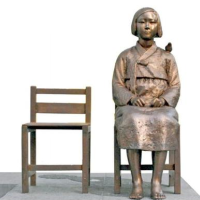Memorial to WWII “Comfort Women” Draws International Fire
 Memorial to Korean "comfort women"
Memorial to Korean "comfort women"
The city of Glendale, California, seeking to honor Koreans who make up 5% of its population, voted to erect a memorial to the tens of thousands of women who were forced to act as sexual slaves or “comfort women” for Japanese soldiers during World War II.
This seemingly humanitarian gesture was not universally appreciated.
A stream of emails, many from Japan, protested the city’s decision, reflecting a surge in revisionist sentiment which denies that the women, many of them not yet adults, were coerced into being prostitutes, and if they were, it was, in the words of Japan’s Osaka Mayor Tōru Hashimoto, “necessary.”
“When soldiers are risking their lives by running through storms of bullets, and you want to give these emotionally charged soldiers a rest somewhere, it’s clear that you need a comfort-women system,” Hashimoto told reporters in May.
Others have said that the women, estimated to be upwards of 200,000, worked in Japanese brothels because it was steady employment, their pimps back home compelled them, their families thought they would be safer during the war or their families sold them to the enemy. Those are not reasons heard from the Korean, Filipino and Chinese women who are still alive to tell the story.
And it’s not an explanation that the Glendale City Council was buying. “A 14-year-old girl doesn't voluntarily leave her village in Korea to go serve the Japanese army. Give me a break,” Councilman Frank Quintero said after the vote. Mayor Dave Weaver said he had received 350 emails opposing the monument, and 27 people, mostly Japanese-Americans spoke against the memorial before the vote on Tuesday. Weaver voted against it, saying he wanted a master plan for the park before deciding on statues, but lost 4-1.
The memorial, a statue of a young Korean woman with a bird on her shoulder seated next to an empty chair, will be a replica of one at the Japanese Embassy in Seoul, South Korea. Proposed memorials in other states, including New York and New Jersey, as well as Singapore, have also been the subject of protests.
Japan officially apologized to the women in 1993, but conservative nationalists there have been agitating the past 20 years for a new reading of the historical record. Many claim that the number of women pressed into service was greatly exaggerated and was probably closer to 20,000 than 200,000.
Although Hashimoto said his remarks in May were misinterpreted, he argued that there was no evidence that the Japanese government had anything to do with wartime “comfort women”—not that it would necessarily have been a bad thing then, or now. He suggested that the United State should follow the practice at its bases in Japan to reduce incidents of rape: “We can’t control the sexual energy of these brave Marines....They must make more use of adult entertainers.”
-Ken Broder
To Learn More:
Glendale Steps Into Controversy with Memorial to WWII Sex Slaves (by Jack Dolan and Jung-yoon Choi, Los Angeles Times)
Glendale Approves Korean “Comfort Woman” Statue Despite Protest (by Brittany Levine, Glendale News-Press)
Glendale Moves Forward on Proposed “Comfort Women” Memorial (by Christina Villacorte, Los Angeles Daily News)
How “Comfort Women” Court Ruling Led to Kyoto Dinner Tiff (by Yuka Hayashi, Wall Street Journal)
The Mayor and the Comfort Women (by Amy Davidson, New Yorker)
- Top Stories
- Unusual News
- Where is the Money Going?
- Controversies
- U.S. and the World
- Appointments and Resignations
- Latest News
- Trump to Stop Deportations If…
- Trump Denounces World Series
- What If China Invaded the United States?
- Donald Trump Has a Mental Health Problem and It Has a Name
- Trump Goes on Renaming Frenzy






Comments